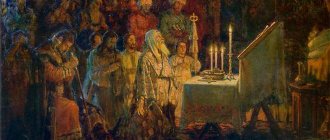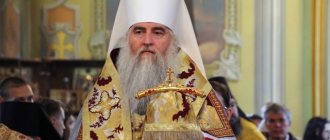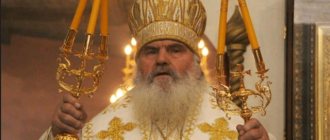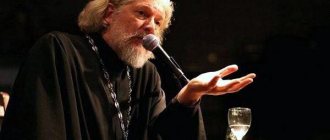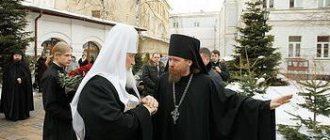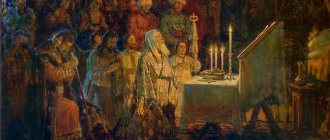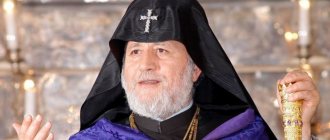Patriarch Alexy I - known in the world as Sergei Vladimirovich Simansky - was born in 1877 (died in 1977), was an Orthodox priest, a member of the Holy Synod, a doctor of theological and legal sciences.
He distinguished himself by having the longest tenure as Patriarch of Moscow and All Rus'. In addition to his service, he became famous as an excellent teacher.
The patriarch was born into a wealthy family and received a good education
The future patriarch Alexy was born into the family of a valet of the imperial court and the daughter of a famous nobleman. According to the pre-revolutionary traditions of all wealthy families, the boy received his primary education at home.
Later he entered the Institute of Oriental Languages, where he studied from 1888 to 1891. This educational institution had a standard gymnasium with a five-year course, but also had the option of a three-year course with in-depth study of languages of the Middle East.
Beginning in 1891, he received his education at the Moscow Lyceum of Tsarevich Nicholas, along with other aristocrats.
The lyceum influenced the young man's fragile mind.
He became interested in pro-monarchist movements.
In 1908, Alexy became chairman of the branch of the Union of Russian People in the Tula province.
This organization was counter-revolutionary, monarchical, and included many clergy.
In 1896 he graduated with honors from the Lyceum and entered the Faculty of Law at Moscow University. However, he lived on the territory of the previous place of study. Three years later he completed his studies and defended his PhD in Law. Topic of the thesis: “Combatants and non-combatants during the war.”
Bishop of Tehvinsky Alexy. The Patriarch received this rank in 1913
Obeying the same aristocratic traditions, he underwent voluntary military service in a grenadier regiment. He spent 2 years in the army (1889 - 1900), after which he went into the reserves with the rank of ensign. Almost immediately I entered the second higher education at the Moscow Theological Academy.
He studied there for four years, after which he defended his candidate’s dissertation on the topic “Dominant concepts in modern moral and legal consciousness” before Metropolitan Philaret. Received the title of Candidate of Theology.
See also the article Priest Alexey Moroz
Monasticism and educational activities
| 1902, February 2 | He was tonsured a monk by Bishop Arseny. Everything happened in the Trinity-Sergius Lavra |
| 1902, March 17 | Received ordination to hierodeacon |
| 1903, December 21 | Promoted to hieromonk |
| 1904 – 1906 | He holds the position of inspector of the Pskov Theological Seminary. At the same time, he teaches the Holy Scriptures there |
| 1906 | Promoted to the rank of archimandrite, placed at the head of the Tula Theological Seminary |
| 1911, October 6 | He holds the post of rector of the Novgorod Theological Seminary. Part-time he becomes the abbot of the Anthony Monastery. His patron Arseny received a promotion and took the initiative in promoting Alexy |
| 1913, March 28 | After the report of the Holy Synod to Emperor Nicholas II, Alexy received the position of Bishop of Tikhvin and second Vicar of the Novgorod diocese. The naming took place on April 28 of the same year |
| 1913, April 27 | Elected Chairman of NEUS - Novgorod Diocesan Educational Council |
Education and military service[edit | edit code]
He received his primary education at home. From 1888 to 1891 studied at the Lazarevsky Institute of Oriental Languages, which then consisted of a five-year gymnasium and special classes with a three-year period of study in Arabic, Persian, Turkish, as well as the history, languages and culture of the countries of the East and Transcaucasia.
In 1891 he was transferred to an aristocratic educational institution - the Katkovsky Lyceum (since 1893, the Imperial Lyceum in memory of Tsarevich Nicholas), from which he graduated in 1896.
In 1896 he entered the Faculty of Law of the Imperial Moscow University, continuing to live at the Lyceum. He completed the full course in three years and received an academic degree of candidate of rights for his essay Combatants and non-combatants during the war
.
In 1899-1900 was in military service as a volunteer in the 7th Samogit Grenadier Regiment. He retired to the reserve with the rank of warrant officer.
In 1900 he entered the Moscow Theological Academy, from which he graduated in 1904 with a candidate’s degree in theology (the topic of his thesis was “The dominant concepts in modern moral and legal consciousness before the court of Metropolitan Philaret”). The then rector of the academy, Bishop (then Metropolitan) Arseny (Stadnitsky), had a significant influence on him; The inspector of the Academy was Archimandrite Evdokim (Meshchersky).
After the Great October Revolution
The coming to power of the Bolsheviks is considered by many to be the beginning of the collapse of the Russian Orthodox Church. And if you look at the facts, this opinion is only confirmed. At the same time, it is also believed that the Russian Orthodox Church supported Emperor Nicholas II worldwide. However, this fact is also very doubtful.
After all, after the abdication of the monarch, the Holy Synod helped the provisional government.
The reason is in the decree of Peter the Great on the creation of the Holy Synod. The decree stated that the church could not influence the secular government, part of its lands was taken away from it, but most importantly, it was completely subordinate to the monarch.
Bishop Alexy of Yamburg
Therefore, when the February Revolution took place, church leaders perceived this as an advantageous opportunity and immediately declared Peter’s decree invalid. However, such freedom of the church did not last long.
Already in October 1917, Russia was shocked by a new revolution, which forever changed the face of our country. The Bolshevik party came to power. The new doctrine of governing the country did not please the entire aristocracy and part of the church elite.
Beginning in 1920, the so-called “Red Terror” began. This period of history is perceived negatively in relation to the Bolsheviks. However, it is worth considering that this was a necessary measure.
The pro-monarchist “white” movement was actively gaining strength, and intervention took place on the part of the Entente states.
During these years, the people were divided into several camps and the church, as part of the people, was also divided.
Therefore, the persecution of priests can be logically explained by a simple fight against hostile forces opposing the communists. Church ministers loyal to the “reds” were almost unharmed.
Assumption Cathedral in Moscow: This is where Alexy I rests
It was during such a difficult time that Alexy I lived and worked. He constantly disappeared into the offices of the Emergency Committee. The first time I managed to get off with a suspended sentence, the second - with exile. At the same time, the career path of the future patriarch turned out to be thorny and unpredictable.
In particular, in 1941 he worked as an archbishop in Leningrad. He spent the entire blockade in the city of Petra. He organized charity events, obtained additional rations for his flock and provided all possible assistance to the authorities.
1941
Alexy I works as an archbishop in Leningrad, where he will spend the entire blockade
In 1943, Alexia, along with Metropolitan Sergius and Nicholas, were invited to a meeting with Stalin at the General Staff located in Moscow.
The result of the meeting was a resolution to allow the opening of new religious schools and a proposal to elect a patriarch.
Also in the fall of 1943, a new patriarch, Sergius, was elected.
Patriarch Alexy I in the later years of his life
Alexy I, Patriarch
Patriarch Alexy I (in the world Sergei Vladimirovich Simansky) was born on October 27 (November 8), 1877 in Moscow into a noble family. Russian.
Father - Vladimir Andreevich Simansky (1853-1929) served in the office of the Moscow Governor-General, then in the Orphanage; in 1891 he retired, receiving the rank of chamberlain and was assigned for life to the Office of the Holy Synod.
Mother - Olga Aleksandrovna Simanskaya (Porokhovshchikova).
- He received his primary education at home.
- From 1888 to 1891 he studied at the Lazarevsky Institute of Oriental Languages, which then consisted of a five-year gymnasium and special classes with a three-year period of study in Arabic, Persian, Turkish, as well as the history, languages and culture of the countries of the East and Transcaucasia.
- In 1891, he was transferred to an aristocratic educational institution - the Moscow Lyceum of Tsarevich Nicholas (“Katkovsky”), whose director at that time was the famous monarchist V. A. Gringmut. Studying at this institution had a significant impact on the young man’s worldview; he became close to the Moscow monarchist movement, and subsequently, in 1908 in Tula, he was elected chairman of the provincial department of the Union of the Russian People, the largest monarchist organization in the empire.
- After graduating from the Lyceum in 1896, he entered the Faculty of Law of the Imperial Moscow University, continuing to live at the Lyceum. He completed the full course in three years and received the academic degree of candidate of rights for his essay “Combatants and non-combatants during the war.”
- In 1899-1900 he served in military service as a volunteer in the 7th Samogit Grenadier Regiment. He retired to the reserve with the rank of warrant officer.
- In 1900 he entered the Moscow Theological Academy, from which he graduated in 1904 with a candidate’s degree in theology (the topic of his thesis was “The dominant concepts in modern moral and legal consciousness before the court of Metropolitan Philaret”).
- On February 9, 1902, in the Gethsemane skete of the Trinity-Sergius Lavra, he was tonsured a monk by Bishop Arseny; On March 17 of the same year he was ordained a hierodeacon, and on December 21, 1903, a hieromonk.
- In 1904-1906 - inspector of the Pskov Theological Seminary, at the same time teaching the Holy Scriptures of the New Testament (during this period, Bishop Arseny was the Pskov bishop).
- In 1906 he became an archimandrite
- From 1906 to 1911 he was the rector of the Tula Theological Seminary, also the editor of the unofficial part of the Tula Diocesan Gazette, was the chairman of the Council of the Tula Brotherhood in the name of St. John the Baptist, and published in the Tula periodical press.
- From October 6, 1911 - rector of the Novgorod Theological Seminary and, at the same time, rector of the monastery of St. Anthony the Roman (Vladyka Arseny had by that time become Archbishop of Novgorod and the transfer of Archimandrite Alexy was carried out on his initiative).
- On March 28 (Old Art.), 1913, the report of the Holy Synod on the existence of Archimandrite Alexy as Bishop of Tikhvin, 2nd Vicar of the Novgorod Diocese (the diocesan bishop was Archbishop Arseny (Stadnitsky)) was highly approved (by Emperor Nicholas II).
- The naming on April 27, 1913 in the Cathedral of Entry into Jerusalem in the Novgorod Kremlin and the consecration on April 28, 1913 in the St. Sophia Cathedral was led by Patriarch Gregory IV of Antioch (was in Russia on a visit) in the concelebration of Arseny (Stadnitsky) and others; Chief Prosecutor V.K. Sabler was present. By decree of the Holy Synod of May 27, 1913, he was confirmed as chairman of the Novgorod Diocesan School Council.
- According to the Highest decree of December 11, 1916, from January 8, 1917, upon his consecration as bishop (2nd vicar of the Novgorod diocese) Barsanuphius (Lebedev), began to be called the first vicar.
- In January 1920, together with Metropolitan Arseny, he was arrested by the Novgorod Cheka, but soon both bishops were released.
- In November 1920, he appeared in court on charges of unauthorized examination of the relics of saints on the eve of their opening by the authorities and was sentenced to a suspended sentence.
- On February 21, 1921, Patriarch Tikhon, at the request of Metropolitan Veniamin (Kazan) of Petrograd, was appointed Bishop of Yamburg, first vicar of the Petrograd diocese. Having moved to Petrograd, he lived in a house at the Kazan Cathedral, then in the Alexander Nevsky Lavra.
- Despite the entreaties of the former Bishop of Penza Vladimir (Putyaty), who arrived in Petrograd in April 1921, to leave Petrograd and take the Penza see, he successfully resisted the transfer.
- On May 29, 1922, after the arrest of Metropolitan Veniamin (Kazan), he took over the administration of the diocese. Under strong pressure from the authorities, he lifted the excommunication of one of the leaders of the Renovationism, Archpriest Alexander Vvedensky (the decision to excommunicate was made by Metropolitan Veniamin), but refused to submit to the fraudulent Renovationist Higher Church Administration of Metropolitan Antonin (Granovsky). In view of the latter’s ultimatum to either recognize his power or leave St. Petersburg, on June 24, 1922, he resigned from his duties as temporary administrator of the diocese. After 2 months, together with another Petrograd vicar, Bishop Nikolai (Yarushevich) of Peterhof, he established the “Petrograd autocephaly”, which declared loyalty to the authorities, but did not join any of the movements. According to Pitirim (Nechaev), Vvedensky’s acceptance into communion was made in exchange for a promise to save the life of Metropolitan Veniamin
- In October 1922, he was arrested on charges of “counter-revolutionary activities”, convicted and at the end of the same year exiled for three years to the city of Karkaralinsk (now in the Karaganda region), where he had the opportunity to serve in the city church; was in correspondence with Patriarch Tikhon and Metropolitan Sergius (Stragorodsky).
- In March 1926, he was allowed to return to St. Petersburg, where he continued his fight against renovationism.
- In September 1926, Metropolitan Sergius appointed him administrator of the Novgorod diocese with the title of Archbishop of Tikhvin, later of Khutyn (the diocesan bishop, Metropolitan Arseny, was in exile in Central Asia and could not manage the diocese). At that time he lived in his father’s apartment on Bolshaya Dvoryanskaya, on the Petrograd side. He usually served in the wooden Trinity-Petrovsky Cathedral on the Petrograd Side (demolished in 1936).
- From 1927 to 1935 - member of the Provisional Patriarchal Synod, created by the Deputy Patriarchal Locum Tenens, Metropolitan Sergius (Stragorodsky) (from the date of the establishment of the Synod until its “self-dissolution”). He supported the church-political course of the latter. One of the demands to Metropolitan Sergius (Stragorodsky), expressed in a letter from the clergy and laity of Leningrad, opposed to the “Declaration of 1927,” which was handed to Metropolitan Sergius on December 12, 1927, was: “Review the composition of the Provisional Patriarchal Synod and remove disputable persons from it , especially Metropolitan Seraphim of Tver (Alexandrov) and Archbishop Alexy (Simansky).”[5]
- Since May 19, 1932 - Metropolitan of Starorussky. In August 1933, he was appointed Metropolitan of Novgorod (after the official transfer of Bishop Arseny to the Tashkent See).
- On October 5, 1933, upon the retirement of Metropolitan Seraphim (Chichagov), he became the regional metropolitan of Leningrad (the “region of the Metropolitan of Leningrad” included all the dioceses that were within the borders of the Leningrad region at that time: Leningrad, Novgorod, Borovichi, Pskov and Cherepovets).
- On October 29, 1933 he arrived in Leningrad; settled in the abbot's chambers of the Novodevichy Convent at the Moscow outpost; in 1937 he was evicted from there and lived in the bell tower of the Prince Vladimir Cathedral; from 1940 - in the choirs of the St. Nicholas Cathedral, which became a cathedral, and where he usually served from that time on.
- During the “Great Terror” of 1937-1938, about 800 priests and deacons serving in the “region of the Metropolitan of Leningrad” were shot, and by 1941 the number of operating churches in this territory, including Leningrad, did not exceed 20.
- During the war, during the blockade of Leningrad, he remained in the city, performed liturgies and prayer services, preached, encouraged and consoled the believers. On weekdays, often without a deacon, he himself administered communion and read the memorials. He constantly addressed patriotic messages to his flock.
- On September 4, 1943, he was together with Metropolitans Sergius (Stragorodsky) and Nikolai (Yarushevich) at a meeting with Stalin in the Kremlin. The result of the meeting was Stalin's order to elect a Patriarch and allow the opening of church educational institutions; V. M. Molotov became the party curator of church policy, and its direct conductor was State Security Colonel G. G. Karpov, who headed the Council for the Affairs of the Russian Orthodox Church under the Council of People's Commissars of the USSR.
- On September 8, 1943, he participated in the council of bishops that elected Metropolitan Sergius to the Patriarchal Throne. He was a permanent member of the Holy Synod formed under Patriarch Sergius. On December 10, 1943, even before the liberation of Novgorod from occupation, he received the title of “Metropolitan of Leningrad and Novgorod.”
- On February 2, 1945, he was elected Patriarch of Moscow and All Rus' at the first Local Council of the Patriarchal Church (not Renovationists) after 1918.
- On April 10, 1945, a meeting between the Patriarch and Stalin took place, in which Metropolitan Nikolai (Yarushevich) and Protopresbyter Nikolai Kolchitsky, manager of the affairs of the Moscow Patriarchate, also participated from the church side; The government, besides Stalin, was represented by V. M. Molotov.
- Stalin outlined to the hierarchs his vision of the contribution that the Moscow Patriarchate had to make to strengthening the international positions of the USSR, aimed them at taking a leading role in universal Orthodoxy, acquiring the necessary contacts, and political neutralization of anti-Soviet Russian emigration. The prospects for expanding the network of theological schools and creating a church publishing and printing base were also discussed.
- From May 27, 1945 to June 26, 1945, Patriarch Alexy made the first pilgrimage in the history of Moscow high priests to the Holy Land, paying visits to the Eastern patriarchs.
- On October 22, 1945, the Serbian Church formalized the transfer of the Mukachevo-Pryashevsky diocese to the canonical jurisdiction of the Moscow Patriarchate.
- Since the opening of the Trinity-Sergius Lavra on Easter 1946, he has been its sacred archimandrite. Through the care of Patriarch Alexy, the Lavra in a short time became the spiritual center of Russian Orthodoxy.
- In the spring of 1947, the Patriarch asked the Council for the Affairs of the Russian Orthodox Church to petition the government to transfer to the Patriarchate and dioceses some of the previously confiscated relics, which was partially satisfied by the government (in particular, the relics of St. Alexy were transferred to the Epiphany Cathedral in Moscow), despite the negative position of the Council in this question.
- In July 1948, the 500th anniversary of the autocephaly of the Russian Church was solemnly celebrated in Moscow. The meeting of the Heads and Representatives of local Orthodox Churches was timed to coincide with the anniversary (initially the event was conceived by the leadership of the USSR as an ecumenical council “to resolve the issue of conferring the title Ecumenical on the Moscow Patriarchate”), which condemned the ecumenical movement and union as a tool for the expansion of papism. However, the primates of the Eastern Greek Patriarchates did not attend the Meeting.
- Since mid-1948, the state's policy towards the Church and religion has become significantly tougher. Repressions begin against individual active bishops, and the active interference of the Council in the personnel policy of the Patriarchate becomes overt.
- In 1952, on the occasion of the 75th anniversary of the Patriarch, the government provided the Moscow Patriarchate with the territory of the former Kolychev-Bode Lukino (Peredelkino) estate. A patriarchal residence near Moscow was established there.
- Even earlier, in 1946, the construction of the Patriarch’s summer residence in the Assumption Monastery in Odessa began.
- On July 7, 1954, the CPSU Central Committee adopted a resolution “On major shortcomings in scientific-atheistic propaganda and measures to improve it,” which called on party organizations to actively fight “religious prejudices and superstitions” and to expose “the reactionary essence and harm of religion.” On November 10 of the same year, the CPSU Central Committee issued a resolution “On errors in carrying out scientific and atheistic propaganda among the population,” which marked a temporary suspension of the active attack on religion.
- From the recording of Karpov’s conversation with the Patriarch on April 17, 1956, it is clear that while the Patriarch listened to the recommendations of the Council, in personnel matters he was not a mechanical executor of Karpov’s instructions; Thus, in response to the latter’s recommendation not to appoint Metropolitan Nestor (Anisimov), in connection with the death of Odessa Archbishop Nikon (Petin), to the Odessa See and the proposal to appoint Boris (Vic) there, the Patriarch “without saying anything about Boris, said: “In In this case, I will appoint Nestor to Kazan.” (An hour later, I learned that the Patriarch, having allowed Metropolitan John of Kiev to go to Odessa for the funeral, gave instructions to summon Archbishop Boris to Odessa, who would be entrusted with conducting the service associated with Nikon’s funeral. Does this mean that the Patriarch will leave him in Odessa or not , it’s hard to say yet). The Patriarch informed me that he was appointing priest Konoplyov, who serves in the church on Vorobyovy Gory, as bishop for the Voroshilovgrad diocese. "
- On May 17, 1958, the Patriarch, together with Metropolitan Nikolai (Yarushevich), was received by N. Khrushchev as the head of the USSR government; the conversation that took place, during which the Patriarch expressed a number of requests, instilled in him a certain optimism. However, already in the autumn of the same year, the line of a frontal attack on religion and religious organizations in the USSR won in the party apparatus.
- At the end of 1958, a new large-scale campaign to eradicate religion in the USSR, initiated by N. Khrushchev, began: churches (especially in Ukraine, Belarus and Moldova) were closed in the hundreds, many were immediately destroyed. More than 40 monasteries were closed, including the Kiev Pechersk Lavra, 5 seminaries out of 8 were liquidated, publication of the journal of the Exarchate of Ukraine “Orthodox Bulletin” was stopped, and the number of bishops was reduced. Some of the most active religious figures were subjected to criminal prosecution, provocations and riots were organized during Easter services, a number of clergy publicly defrocked themselves and engaged in state-funded atheistic propaganda. At first, the Patriarch tried, to the best of his ability, to resist the anti-church onslaught. During a meeting with Georgy Karpov on February 20, 1959, the Patriarch protested against the tax on candle production and attacks in the press against the church and clergy, to which Karpov replied that the decisions would not be canceled and they must be implemented in full; on the issue of opening “13 - 15 churches,” which, according to the Patriarch, was previously promised by Nikita Khrushchev during their meeting, Karpov “reminded the Patriarch that N.S. Khrushchev did not promise to open new churches, but stated, that when the letter is sent, the government will look into the matter.”
- During 1959, the Patriarch unsuccessfully sought a meeting with Khrushchev, sent a letter and a note addressed to him, which Karpov considered “as a kind of complaint against the Council” (which he directly stated to the Patriarch). In a letter to Karpov dated November 20, 1959, the Patriarch outlined a list (11 points) of problems that he would like to raise in a conversation with Khrushchev, the first of which was: “1. The ongoing attack on the clergy and believers under the banner of anti-religious propaganda, with distortion and unverified facts, with conclusions that offend the religious feelings of a believer, with discrediting the clergy in general in the eyes of the people with the aim of discrediting the entire church and its ministers.” On December 10 of the same year, the Patriarch and other persons were received by Karpov, who, after listening to the concerns of the Patriarchate, stated, in particular, that “scientific atheist propaganda has been and will be carried out, and it will be carried out on an even wider scale - this is the law of the development of our society "; summing up the conversation, Karpov said: “We say once again that from our point of view, these issues are not an issue to be raised in the government.” That was Karpov's last meeting with the Patriarch.
- On December 30, 1959, the Holy Synod issued a resolution: “The former archpriest and former professor of the Leningrad Theological Academy Alexander Osipov, the former archpriest Nikolai Spassky and the former clergyman Pavel Darmansky and other clergy who publicly blasphemed the name of God should be considered deposed from the priesthood and deprived of all church communion < “...> Evgraf Duluman and other former Orthodox laity who blasphemed the name of God should be excommunicated from the Church.”
- In February 1960, at a meeting of the Conference of the Soviet Public for Disarmament (Moscow, 1960), the Patriarch in his speech spoke about the historical merits of the Orthodox Church and that today it is unfairly “experiencing attacks and censure”: <...> The Church of Christ, which considers its own The goal is the good of people, but it experiences attacks and reproaches from people, and yet it fulfills its duty, calling people to peace and love. In addition, in this position of the Church there is much comfort for its faithful members, for what can all the efforts of the human mind against Christianity mean if its two-thousand-year history speaks for itself, if all the hostile attacks against it were foreseen by Jesus Christ Himself and gave the promise of steadfastness Church, saying that even the gates of hell will not prevail against His Church.
- Probably due to the fact that the speech was perceived as disloyal and defiant, its actual authorship was assumed by Metropolitan Nikolai (Yarushevich) of Krutitsky and Kolomna. On April 21, 1960, Kuroyedov, citing in an extract the Patriarch’s speech at a public conference, said: “This speech was essentially an attack against scientific-atheistic propaganda. The council explained to the patriarch that such views are hostile.”
- On June 15, 1960, V. A. Kuroyedov, the new chairman of the Council for the Affairs of the Russian Orthodox Church under the Council of Ministers of the USSR, had a conversation with the Patriarch, during which the First Hierarch was warned about the “completely unsatisfactory delivery” of the external work of the Patriarchate. Kuroyedov demanded that Metropolitan Nicholas be removed from the post of DECR Chairman and from the Krutitsky See, which was carried out in stages.
- At a meeting on September 12, 1960, the Council for the Affairs of the Russian Orthodox Church decided, among other things: “1. Recognize it expedient for the Russian Orthodox Church to become members of the World Council of Churches in order to increase attention to the nature and direction of its activities in the interests of peace. <…> 3. Instruct Comrade Kuroyedov to negotiate with Patriarch Alexy on the issue of the Russian Orthodox Church becoming a member of the World Council of Churches.”
- On April 1, 1961, at the height of the anti-religious campaign, during an all-night vigil in Yelokhov, the Patriarch was attacked by a certain citizen, who was subsequently officially declared insane.
- In 1961, he was unable to resist the demand of the Council for the Affairs of the Russian Orthodox Church to limit the role of rectors in parishes to purely liturgical and pastoral duties, transferring all economic and financial functions to the executive bodies of the religious community (parish), that is, the parish council and the elder, who were actually appointed by state bodies authorities. The corresponding changes to the 4th section (“On parishes”) of the Regulations on the governance of the Russian Orthodox Church (adopted at the Local Council in 1945) were made by the Council of Bishops on July 18, 1961, based on the report of Archbishop Pimen (Izvekov). (The actual decision on the division of responsibilities of the clergy and executive bodies was made and immediately implemented by a resolution of the Holy Synod on April 18 of the same year). The 1961 Council also approved the decision of the Holy Synod of March 30, 1961 on the entry of the Russian Orthodox Church into the World Council of Churches.
- In the period from July 14 to July 21, 1963, celebrations were held in Moscow and the Trinity-Sergius Lavra in connection with the 50th anniversary of the Patriarch’s episcopal service, which were attended by representatives of Orthodox and non-Orthodox churches of the world and which, according to the Journal of the Moscow Patriarchate, “ resulted in a truly ecumenical communion of the entire Christian world.”
- At 21:40 on April 17, 1970, he died in Peredelkino from “heart failure” at the age of 93; shortly before he suffered a myocardial infarction.
- From April 18 to 14:00 on April 20, the coffin with the body of the newly deceased was in the Epiphany Cathedral in Elokhov. After carrying the coffin around the cathedral, the funeral procession headed to the Trinity-Sergius Lavra, where on April 21, after the liturgy, a funeral service was held according to the priestly rite. He was buried near the grave of Metropolitan Macarius (Nevsky), deeply revered by him, in the crypt of the Dormition Cathedral of the Lavra.
State awards:
- Order of St. Vladimir, III degree (1915)
- Order of the Red Banner of Labor (August 16, 1946)
- Order of the Red Banner of Labor (November 8, 1952)
- Order of the Red Banner of Labor (November 8, 1962)
- Order of the Red Banner of Labor (November 6, 1967)
- medal "For the Defense of Leningrad" (1943)
- Medal "For Valiant Labor in the Great Patriotic War of 1941-1945" (1946);
Orthodox awards:
- Order of the Holy Equal-to-the-Apostles Grand Duke Vladimir, 1st degree (presented on July 15, 1961)
- Order of St. Mark the Apostle (Alexandrian Orthodox Church)
- Highest orders of the Lebanese and Syrian Republics.
- Grand Ribbon of the Imperial Order of the Holy Trinity
- Order of the Star of Romania, 1st class
Memory:
- Memorial plaque on the house where the Patriarch was born, in Moscow on the street. Myasnitskaya, 46/2 (December 5, 2007)
- The Church and Archaeological Cabinet of the Moscow Theological Academy bears the name of the Patriarch, many of the exhibits of which are gifts from the Patriarch himself.
- In honor of the Patriarch’s visit to the Intercession Cathedral and St. John Chrysostom Church in Astrakhan in 1949, memorial plaques were installed inside these churches.
After the Great Patriotic War
On February 2, 1945, Alexy was appointed Patriarch of Moscow and All Rus'.
So he had more opportunities for work - especially against the backdrop of Stalin's favorable attitude towards the Russian Orthodox Church.
February 2, 1945
Alexy is appointed Patriarch of Moscow and All Rus'
Joseph Vissarionovich allowed the founding of several new churches and many religious educational institutions.
The period of Stalin's rule can be called a “thaw”, because it was allowed not only to found new institutions, but also to expand the composition of the clergy and even economic relief in the form of tax cuts.
Patriarchal Locum Tenens and Patriarch[edit | edit code]
Under I.V. Stalin[edit | edit code]
Patriarch Sergius (Stragorodsky) died on May 15, 1944. According to his will, drawn up back in October 1941, His Eminence Alexy became the Locum Tenens. In his letter on May 19, 1944 to the Chairman of the Council of People's Commissars, Marshal of the Soviet Union I.V. To Stalin, Locum Tenens wrote:
|
A distinctly Sergian position was expressed in the First Message of the Patriarchal Locum Tenens to the Orthodox Russian Church
from May 28:
|
On February 2, 1945, Metropolitan Alexy was elected Patriarch of Moscow and All Rus' at the first Local Council of the Patriarchal Church after 1918. In 1946, Alexy I blessed one of the most controversial events in the history of Russian Orthodoxy: the Ukrainian Greek Catholic Church (the so-called “Uniate”) on the territory of the USSR was abolished by decision of the USSR government, and its flock and property were transferred to the Russian Orthodox Church.
On April 10, 1945, the Patriarch met with I.V. Stalin, in which Metropolitan Nikolai (Yarushevich) and Protopresbyter Nikolai Kolchitsky, manager of the affairs of the Moscow Patriarchate, also participated from the church side; The Soviet government, besides Stalin, was represented by V.M. Molotov.[4]. I.V. Stalin outlined to the hierarchs his vision of the contribution that the Moscow Patriarchate had to make to strengthening the international positions of the USSR, aimed them at taking a leading role in universal Orthodoxy, acquiring the necessary contacts, and political neutralization of anti-Soviet Russian emigration. The prospects for expanding the network of theological schools and creating a church publishing and printing base were also discussed. On the day of the end of the Great Patriotic War in jubilant Moscow, the word “Victory!” was written in the Patriarch’s diary for May 9, 1945.[5].
Greetings from Patriarch of Moscow All Rus' Alexy. RGASPI. F. 558. Op. 11. D. 1349. L. 112; Published: Journal of the Moscow Patriarchate. 1945. No. 7. July. Devyatov S.V., Sigachev Yu.V. Stalin: a view from the outside. The experience of a comparative anthology. M., 2022. 456 pp.: ill. P. 330. ISBN 978-5-91244-245-2
On June 24, 1945, on the day of the Victory Parade, Patriarch Alexy was invited to the podium of the Lenin Mausoleum among the guests of honor, which testified to the constructive cooperation of the Soviet state and the church.[6].
In July 1948, the 500th anniversary of the autocephaly of the Russian Church was solemnly celebrated in Moscow. The meeting of the Heads and Representatives of local Orthodox Churches was timed to coincide with the anniversary, which condemned the ecumenical movement and union as a tool for the expansion of papism. However, the primates of the Eastern Greek Patriarchates did not attend the Meeting.
|
— .
After I.V. Stalin]][edit | edit code]
At the end of 1958, a new large-scale campaign to eradicate religion in the USSR began, in accordance with the resolution of the CPSU Central Committee on the initiative of N.S. Khrushchev: churches were closed, some were even destroyed, some of the most active religious figures were subject to criminal prosecution, provocations and riots were organized during Easter services, a number of clergy publicly deposed themselves and engaged in state-funded atheistic propaganda.
The Patriarch tried, to the best of his ability, to resist the anti-church onslaught. On December 30, 1959, the Holy Synod issued a resolution: “The former archpriest and former professor of the Leningrad Theological Academy Alexander Osipov, the former archpriest Nikolai Spassky and the former clergyman Pavel Darmansky and other clergy who publicly blasphemed the name of God, shall be considered deposed from the priesthood and deprived of all church communion... Evgraf Duluman and other former Orthodox laity who blasphemed the name of God should be excommunicated from the Church.”
[8].
In February 1960, at a meeting of the Conference of the Soviet Public for Disarmament (Moscow, 1960), in his speech he spoke about the historical merits of the Orthodox Church and that today it is unfairly “experiencing attacks and censure”:
|
The speech, apparently written by Mr. Nikolai (Yarushevich), was perceived as disloyal and defiant.
On June 15, 1960, V.A. had a conversation. Kuroyedov, the new chairman of the Council for the Affairs of the Russian Orthodox Church, with the Patriarch, at which the High Hierarch was warned about the “completely unsatisfactory delivery” of the external work of the Patriarchate. Kuroyedov demanded that Metropolitan Nicholas be removed from the post of DECR Chairman and from the Krutitsky See[10], which was carried out “gradually.”
On April 1, 1961, at the height of the anti-religious campaign, during an all-night vigil in Yelokhov, the Patriarch was attacked by a certain citizen, who was subsequently officially declared insane[11].
In 1961, he was unable to resist the demand of the Council for the Affairs of the Russian Orthodox Church to limit the role of rectors in parishes to purely liturgical and pastoral duties, transferring all economic and financial functions to the parish council and the elder, who were actually appointed by state authorities. The corresponding changes to the section on parishes
of the Regulations on the governance of the Russian Orthodox Church
were adopted at the Council of Bishops on July 18, 1961, despite the protests of individual bishops, including Archbishop Hermogenes (Golubev). (The latter’s activities were recognized as “not useful” for the church by the Holy Synod in 1968.) The 1961 Council also approved the decision of the Holy Synod of March 30, 1961 on the entry of the Russian Orthodox Church into the World Council of Churches.
For the first 10–15 years, the Patriarch’s closest co-workers at the helm of church administration were Metropolitans Nikolai (Yarushevich) and Grigory (Chukov), as well as Protopresbyter Nikolai Kolchitsky. After their departure, in the last decade of the Patriarch’s life, his personal secretary Daniil Andreevich Ostapov, a hereditary servant of the Simansky nobles, had a huge influence on him and the daily course of church administration; The foreign policy activities of the Patriarchate were completely in the hands of the DECR Chairman, Archimandrite (later Metropolitan) Nikodim (Rotov). Since December 22, 1964, the Administrator of the Moscow Patriarchate was His Eminence Alexy (Ridiger).
During Khrushchev's time
But such a positive attitude towards the Russian Orthodox Church did not last long.
With the death of Stalin and the coming to power of Nikita Khrushchev, the party set a course for the atheistic education of the people.
At the same time, the church was assigned an insignificant role and the authorities tried in every possible way to limit its influence.
At the same time, a program was launched to reduce the financial support of churches and reduce religious institutions.
Patriarch Alexy, despite all his influence, could not reach the supreme power. Even Alexy’s initiatives permitted by Khrushchev were not implemented.
Memorial plaque on the Moscow house in which Patriarch Alexy lived
But even in such difficult conditions, the patriarch sought to preach Orthodox teaching. Behind the scenes, Alexy allows priests to conduct services.
Several priests suffered for such acts: criminal cases were opened against them. Alexy’s career ended on February 14, 1970, in a regime of constant confrontation with power.
April 17, 1970
Alexy I died in Peredelkino from heart failure
events
- Reception I.V. Stalin to the hierarchs of the Russian Orthodox Church (September 4, 1943)
- Local Council of the Russian Orthodox Church in 1945 (January 31, 1945)
- Celebrating the seventieth birthday of J.V. Stalin (December 21, 1949)
- III All-Union Conference of Peace Supporters (November 27, 1951)
- The first conference of all Churches and religious associations in the USSR (May 9, 1952)
- Conference of Representatives of All Religions in the USSR for Cooperation and Peace among Nations (July 1, 1969)
Origin
Patriarch Alexy II, whose biography is connected with the Russian Orthodox Church for several generations, was born on February 23, 1929 in a very unusual family in the city of Tallinn. The ancestor of the future priest during the reign of Catherine the Second converted to Orthodoxy with the name Fedor Vasilyevich. He was a general, an outstanding public figure and commander. From this hero of the War of 1812 came the Russian family of Riedigers.
The grandfather of the future patriarch was able to take his family out of St. Petersburg to Estonia during the hot times of the revolution. Alexy's father studied at the prestigious Imperial School of Law, but completed his studies in Estonia. Then he worked as a forensic investigator in Tallinn and married the daughter of a colonel in the tsarist army. An Orthodox atmosphere reigned in the family; Alexy's parents were members of the progressive movement RSHD (Russian Student Christian Movement). They participated in religious debates, visited monasteries, and went to church services. When Alexy was very young, his father began studying at pastoral courses, where he met Father John, who later became the boy’s confessor.
The family had a tradition of spending the summer holidays on pilgrimages to various monasteries. It was then that Alexy fell in love with the Pukhtitsa monastery for the rest of his life. In 1940, Father Alexy was ordained a deacon. Since 1942, he served in the Kazan Church of Tallinn and for 20 years helped people find God.
pathological speech
Master of pathological speech.
Genres: modernist sermon.
Patriarch Alexy (Simansky) removes the question of the compatibility or incompatibility of Christianity and communism:
The Christian religion and communism are completely different categories; The Christian religion was established by Christ the Savior, Who created the Church, not the state. By the power of the internal law of grace, the Christian religion improves the internal and external lives of people. The state has its own rules, and by the force of external law it protects the social life of the state in order. Therefore, talking about the compatibility or incompatibility of the Christian religion with one or another form of government means comparing and confusing incompatible concepts[5].
stamps
spiritual values
The relations of Orthodox Christians with all Christians, including Catholics, as well as with believers professing non-Christian religions, in our country are friendly. All believers in our country are united by joint participation in the creation of spiritual values for humanity
[6].
understanding
- The book (“Russian Orthodox Church”, 1958) “will serve the great cause of bringing peoples closer together in the spirit of peace and mutual understanding
”[7].
responsibility
We will awaken in people the consciousness of responsibility for the fate of the world[8].
Joseph Stalin
Supreme Leader[9] • Supreme Leader of the Russian people[10] • Wise Leader[11] • Brilliant Leader[12] • Great Leader[13] • Great and wise Leader[14] • Great Head of our state[15] • Wise builder of our good[16] • Great builder of people's happiness[17].
pathological speech techniques
outright lie
About the Church of the Intercession of the Mother of God in the MDA, renovated in 1913 and destroyed in 1919 by the Bolsheviks[18]:
Like everything temporary on earth, this temple suffered the fate of destruction. And along with the destruction of the temple, the building itself, which contained this temple, gradually began to collapse[19].
On support for Soviet foreign policy:
The Russian Orthodox Church “fully supports the peace-loving foreign policy of our Government, not because, as our enemies say, it is allegedly not free, but because this policy is fair and corresponds to the Christian ideals preached by the teachings of the Church”[20].
inversion
- The great, moral, social power has been abolished; the power in which our people felt their own strength, by which they (Stalin. - Ed.) were guided in their creative works and enterprises, with which they consoled themselves for many years[21].
uppercase instead of lowercase
- The Great Leader
of our people, Joseph Vissarionovich Stalin, passed away[21].
pathological vocabulary
Blessed world, Brotherhood, Great, Mutual understanding, Leader, Universal, Universal peace, Everything, Zeitgeist, International relations, Peace, World peace, Peace-loving forces, Tension, People, Responsibility, Path, Creative, Coexistence, Cohesion, Strengthening peace , Values, Humanity
essays
- Alexy (Simansky), Patriarch
Words, speeches, messages, addresses, reports, articles: In 4 volumes - M.: Mosk. Patriarchate, 1948-1964. - Letters from Patriarch Alexy to his confessor. — M.: Pskovo-Pech. Usp. monastery: Mosk. Shit. monastery, 2000.
- Letters of Patriarch Alexy I to the Council for the Affairs of the Russian Orthodox Church under the Council of People's Commissars - Council of Ministers of the USSR, 1945-1970: in 2 volumes - M.: ROSSPEN, 2010.
- Alexy (Simansky), Patriarch.
Speech before the memorial service for J.V. Stalin, delivered at the Patriarchal Cathedral on the day of his funeral on March 9, 1953 // Journal of the Moscow Patriarchate. - 1953. - No. 4. - P. 3-4.
